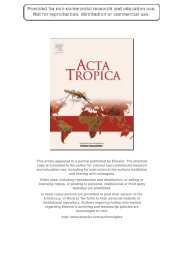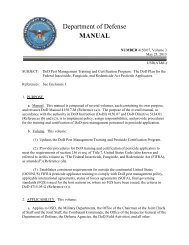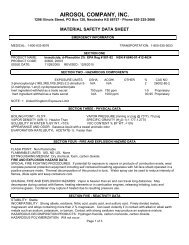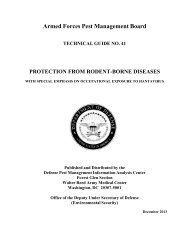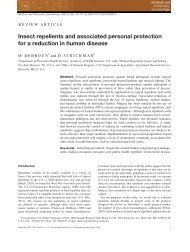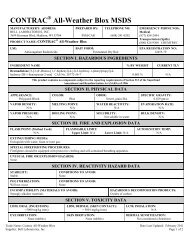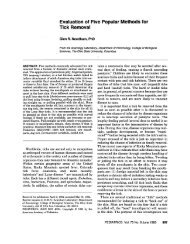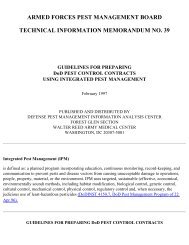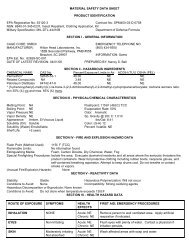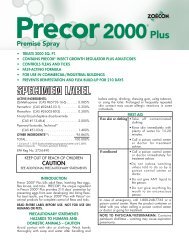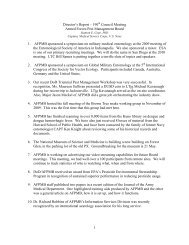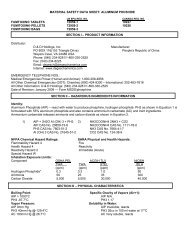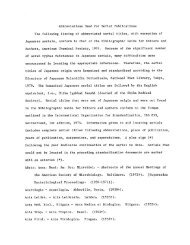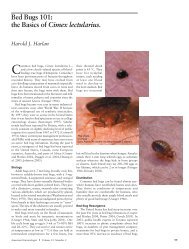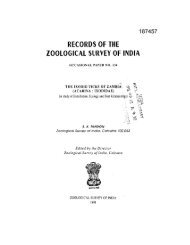Caribbean - Armed Forces Pest Management Board
Caribbean - Armed Forces Pest Management Board
Caribbean - Armed Forces Pest Management Board
Create successful ePaper yourself
Turn your PDF publications into a flip-book with our unique Google optimized e-Paper software.
2. Climate. Aruba’s climate is tropical, moderated by constant trade winds from the Atlantic. It lies outside the<br />
usual <strong>Caribbean</strong> hurricane belt. Temperatures do not vary much daily or seasonally. It is seldom higher than 32 o C<br />
during the day or lower than 24 o C at night. Rainfall averages only about 56 cm per year.<br />
3. Population and Culture. The population of Aruba was estimated in July 2000 to be 69,539 persons, or slightly<br />
more than 360 persons per sq km, and is 80% mixed white and Carib Amerindian and 20% other origins. Religious<br />
preferences are 82% Roman Catholic, 8% protestant, and 10% others, including Hindus, Muslims, Confucianists,<br />
and Jews. The literacy rate is 97%, and the average life expectancy at birth is about 78.4 years. The bulk of the<br />
population is employed in tourism-related industries, offshore financial services, or oil refining.<br />
4. Sanitation and Living Conditions. The standard of living for most Arubans is good, with an economy ranked<br />
among the top 25% in the world, and modern communications and transportation systems. Medical care is available<br />
throughout the country and potable water is generally available. Some serious food-borne and water-borne diseases,<br />
including hepatitis A, are common in addition to periodic outbreaks of ciguatera poisoning. Roads are not clearly<br />
marked but are maintained fairly well. Traffic safety is a concern, and police enforcement is lax.<br />
D. The Bahamas.<br />
1. Geography. The Bahamas is a chain of about 700 islands and 2,400 cays (low islands or reefs of sand or coral,<br />
30 of which are inhabited) in the Atlantic Ocean, about 320 km southeast of Florida. This British Commonwealth<br />
country has a total land area of 10,070 sq km, slightly smaller than Connecticut. The islands are mainly low, flat coral<br />
formations, with some low rounded hills. The highest point in the country is 63 m at Mount Alvernia on Cat Island.<br />
Land use is 1% arable, 32% forests and woodlands, and 67% other. Natural resources include salt, argonite, and<br />
timber. The Bahamas is a developed nation in the top 25% of the world's economies. Tourist facilities are widely<br />
available. Private medical care is available in Nassau and Freeport, but it is not up to the standards of most<br />
industrialized countries. Medical care is substandard outside Freeport and Nassau. The two main industries are<br />
tourism and offshore financial services. All electricity is produced from fossil fuel. The country has 2,693 km of<br />
roads, of which 1,546 are paved, and 62 airports, 33 of which have paved runways. Road maintenance and travel<br />
are limited except for areas in or near Freeport or Nassau. The Bahamas, as a flag-of-convenience registry nation,<br />
has one of the largest registered merchant marine fleets in the world, including 1,075 ships from 49 countries.<br />
Hurricanes and other tropical storms frequently cause extensive flood and wind damage from June through<br />
November. Destruction of coral reefs and solid waste disposal are major environmental concerns. The Bahamas is<br />
strategically located near the U.S. and Cuba. Drug traffic to the U.S. and Europe and related money laundering have<br />
been major criminal concerns in the Bahamas since the 1980s.<br />
2. Climate. The climate of the Bahamas is tropical marine, moderated by the warm waters of the Gulf Stream.<br />
Daytime temperatures typically range between 15°C and 24°C, and winters are mild. Hurricanes and other tropical<br />
storms can cause extensive flood and wind damage from June through November.<br />
Nassau (elevation 4 m)<br />
57



